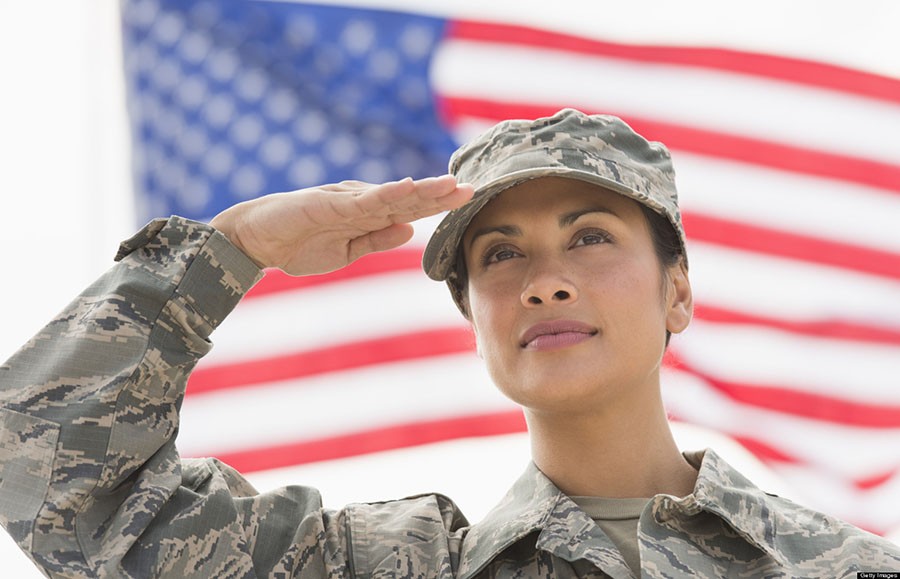Should Women Have the Right to Fight?
As Congress debates the issue of requiring women to register for selective service and engaging in ground combat, TBS students weigh in with their thoughts.
courtesy of Getty Images via www.huffingtonpost.com
A female soldier salutes with the American flag in the background.
Women have had combat roles since 1948, when U.S. President Harry S. Truman signed the Armed Services Integration Act. The purpose of this was to allow women to help the war effort and contribute meaningfully to the American armed forces, but not be soldiers like their male counterparts. However, on December 3, 2015, Secretary of Defense Ash Carter proposed that the Department of Defense should lift all gender-based restrictions starting January 2016, an order that would allow women to serve on the front lines of battle and require them to register with Selective Service, the government agency which “furnishes manpower to the Defense Department during a national emergency.” (www.sss.org)
Congress, though, is still reviewing the department’s mandate. As of the writing of this piece, there has been no decision to require women to register with Selective Service, or be subject to future military drafts. Selective Service continues to register only men, ages 18 through 25.
Still, the issue continues to be debated around the country. As some students see it, mandating females to register for Selective Service and opening the opportunities for them to serve in ground combat like their male counterparts means ultimate equality. “It’s all about giving anyone the choice of going into the military,” said seventh grader Carol Chen. “Gender shouldn’t be a factor.”
In the last hundred years, women have gained many of the same rights as men in the United States, such as voting, educational and athletic opportunities, and equal pay and employment opportunities. Now this issue has come to the forefront, with President Barack Obama lending his support to the desegregation of the military. “The Defense Department is taking another historic step forward by opening up the remaining 10 percent of military positions, including combat roles, to women,” said President Obama. “As Commander in Chief, I know that this change, like others before it, will again make our military even stronger. Our armed forces will draw on an even wider pool of talent.”
Some TBS students agree, as they see this step as just another right being opened up to women. “Women aren’t that different from men, and they deserve the same rights on everything, even this [issue],” said seventh grader Chris Lappert.
For others, allowing women to become soldiers on the front lines of the battlefield means a disadvantage for the troops. “The reasoning should be obvious,” wrote Kathleen Parker of The Washington Post in her piece, “Women in combat will put men at greater risk.” Parker goes on to say that, “Plainly put, men tend to like women quite a lot and either will be tempted to express their attraction, and/or will want to protect their female companions. Will our men be able to withstand the screams of their female companions as they are raped or tortured?”
It’s an unpleasant thought, but a possibility that demands an answer, especially when the lives of American soldiers are at risk. Eighth grader Andrew Armstrong agrees. “I think women should not be in the military because they just are not built the same way as men, and if anything were to happen to a woman in combat, it could mentally scar a man,” he said.
However, some students disagree with that principle. “Why should a man’s health interfere with a women’s rights?” asked seventh grader Madeline Caruso.
Women’s rights have grown significantly over the past 100 years in American society, but is it time for full equality in the military? Congress is still weighing the pros and cons of the issue nearly five full months after Carter’s proposal. There are strong arguments on both sides, not only within our government, but even amongst the students here at TBS.






Jackson LaBonte • Feb 1, 2017 at 8:16 am
Great job on the articles Preston. I just found this when I realized that today is Hudson’s Birthday and all of the kids in my homeroom were asking who he was, so I found a picture of him to show them, and I was redirected to this website. I bookmarked it, so I can see whats going on in Florida.
Sincerely,
Jackson
P.S. I will continue to read if you continue to write.